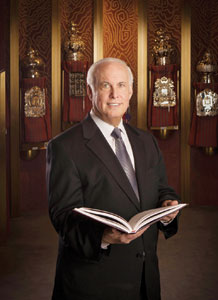 In today’s mobile society, it’s hard to find someone who has spent 35 years at the same job. In 1977, when Rabbi Herbert J. Mandl arrived in Kansas City to serve Kehilath Israel Synagogue, even he would have said it would be tough to fathom that he’d be here that long.
In today’s mobile society, it’s hard to find someone who has spent 35 years at the same job. In 1977, when Rabbi Herbert J. Mandl arrived in Kansas City to serve Kehilath Israel Synagogue, even he would have said it would be tough to fathom that he’d be here that long.
“I absolutely thought this would be an intermediary stop. I had never been to the Midwest before. I had been the assistant rabbi in a mega congregation and I assumed I would end up on the East Coast in a mega congregation,” he said.
But he and his family fell in love with Kansas City and the congregation, which now serves 600 members. So much so that when he retires on Aug. 1, he has no immediate plans to leave the area.
“Three of our four children live in New York, so I expect down the road we’ll move to that area. But for now we’re sticking around,” Rabbi Mandl said in a recent interview.
The congregation is honoring Rabbi Mandl with a gala weekend June 1 through June 3 (see below for details). Now 67, he is enjoying looking back at the past 35 years and ahead to the future.
Keeping the tradition
The rabbi was born and raised in Baltimore. He went to rabbinical school after graduating from Johns Hopkins University and was ordained by the Jewish Theological Seminary of America in New York City in 1969. While serving his first two congregations in Canada, he began working on his doctorate from the University of Montreal. He completed it in May 1981 here in Kansas City. He obtained an Orthodox ordination in 1974.
His first job in the rabbinate was senior rabbi of Congregation Beth Sholom in Edmonton Alberta Canada. Prior to coming to Kansas City, he worked as an assistant rabbi for six years in Montreal.
One thing that intrigued Rabbi Mandl about K.I., and something he still loves about it today, is the fact that it is a “traditional” congregation. In his words, that’s a congregation with “an Orthodox service with mixed seating.”
“I had never heard the word traditional in that sense before I applied for this position. It is a Midwest concept born in Chicago back in the ’40s,” he explained.
In 1977, Rabbi Mandl estimates there were about 25 other traditional congregations in the United States, all with more than 500 families. Today there are fewer than a dozen in the country that match that description.
The congregation was 65 years old when Rabbi Mandl came, and its steady rabbinic leadership was another thing that attracted him to it.
“I thought the fact that there had been a rabbi here for almost 40 years spoke well for the congregation,” he said. “The day school was just starting to bloom in those days and that was attractive to us. There was also talk of moving to Johnson County because we were in Kansas City, Missouri.”
Now when steady rabbinical leadership is mentioned, Rabbi Mandl’s name is near the very top of the list, not only for K.I., but the entire city. The rabbi with the longest tenure in K.C. is Rabbi Samuel S. Mayerberg of The Temple, Congregation B’nai Jehudah, where he served for 40 years. Next on the list is K.I.’s Rabbi Maurice Solomon, who came to K.I. in 1934 and retired in 1972 — five years before Rabbi Mandl joined the congregation (following short stints at the congregation by Rabbi Gilbert Shoham and Rabbi Avraham Radzik). Other famous K.C. rabbinical names served less time in Kansas City, including Congregation Beth Shalom’s Rabbi Gershon Hadas (32 years) and Rabbi Morris Margolies (27 years). Congregation Beth Torah’s Rabbi Mark Levin has actually been in K.C. one year longer than Rabbi Mandl, arriving in 1976, and has served as the Reform congregation’s spiritual leader for 24 years.
Simply put, K.I. President Steve Osman said the congregation is deeply appreciative for Rabbi Mandl’s commitment to the congregation.
“For 35 years Rabbi Mandl dedicated his life to doing what was best for K.I.,” Osman said.
“Rabbi Mandl is a man of great intellect with superior communication skills. He set a standard for all events that will be difficult to match,” Osman added.
The rabbi has contributed to the congregation’s steady leadership, steering its move to its current location in Overland Park in 1986. He is proud that over the years he has continued to guide K.I. to go out of its way to offer community services and “to do things the right way.”
“We built the mikvah and offered to have it here because we had it in the old building and thought it was the right thing to do. When I developed the citywide all night Shavuos program, we were the ones to say we’ll do it here. Most of the citywide Yom HaAtzmaut celebrations have been here as well,” he said.
A legacy of accomplishments
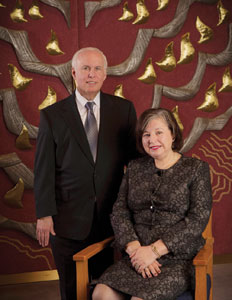 Although he chose the rabbinate, Rabbi Mandl said he had always wanted to be a lawyer and a politician. Over the years he put some of those skills to work, taking on a variety of causes. One was kashrut, working tirelessly to see to it that kosher food was available in the community. He is credited with creating the Vaad HaKashruth. He currently serves as its chairman, a position that the Vaad’s Executive Director Mendal Segal said he will keep as long as he lives in Kansas City.
Although he chose the rabbinate, Rabbi Mandl said he had always wanted to be a lawyer and a politician. Over the years he put some of those skills to work, taking on a variety of causes. One was kashrut, working tirelessly to see to it that kosher food was available in the community. He is credited with creating the Vaad HaKashruth. He currently serves as its chairman, a position that the Vaad’s Executive Director Mendal Segal said he will keep as long as he lives in Kansas City.
“When I first came here there were a couple of strongholds that were not kosher. One was Oakwood and the other was the Alameda Plaza hotel. I hammered away at both until we got both of them kosher,” he said.
Among the rabbi’s many other accomplishments in the kosher realm, and quite possibly the one that impacts the most people, is the role he played to get fresh kosher food sold at the Hen House Market in Leawood when the city’s only kosher free-standing butcher shop closed.
He’s also been actively involved with the Rabbinical Association of Greater Kansas City, serving as president three different times — once each in the ’70, ‘90s and currently. Last year the RA’s governing body changed its bylaws, allowing the rabbi to serve a third consecutive year as president. This way he could continue to hold that leadership position during his last year as an active pulpit rabbi.
“I thought that was a nice tribute from my colleagues,” Rabbi Mandl said.
He didn’t confine his work to the Jewish community. He lobbied the Missouri legislature to remove the phrase “year of our lord” from the Missouri marriage license. He got Hebrew added to the airport welcome signs in Kansas City, St. Louis and Springfield, Mo. He fought for the repeal of the blue laws (mandating stores close on Sunday) in Missouri.
“In my younger years I was a real political activist for local issues that needed to be resolved,” he said.
He also received two political appointments over the years. From 1980 to 1986 he served as chairman of the Missouri Health Facilities Review Commission — a nine-member governor-appointed body that controls health care costs in Missouri. Then he served a six-year appointed term (1990-1996) on the Kansas Public Discloser Commission, which regulates ethical behavior of legislators and state employees.
K.I. rabbi emeritus
Contractually Rabbi Mandl has no specific duties when his title changes to rabbi emeritus. He expects to attend morning minyan several times a week, sit on the pulpit on Shabbat when he’s in town and assist the new rabbi, Rabbi Shmuly Yanklowitz, when asked.
“I’m sure after all these years congregants will seek advice, although I’ve made it very clear to the congregation that there’s a new rabbi and he’s the boss. That’s the way it should be,” he said.
Rabbi Mandl has taught theology at Rockhurst University for the past 20 years and plans to continue teaching in his role as adjunct professor for the immediate future. He’s also been invited to take part in two prestigious opportunities overseas.
In February he’ll conduct research at the Vatican. The library is only open by invitation, said the rabbi, whose doctorate was in Catholic and Jewish law.
“I’ve also been invited to be a part of the Oxford Round Table next year, which is a roundtable of 45 scholars from around the world. How I got invited to that I’ll never know. You can’t find out, it’s a closed invitation system,” he said.
He and his wife, Barbara, will also travel more often to visit their four children — Aron lives in Houston while Seth, Debbie and Miriam live in New York.
When congregation’s historians look back on Rabbi Mandl’s tenure, he hopes they remember him for his “loyalty to the congregation.”
“My children paid the price of some of that. The congregation came first, very often, before family. Of course my wife was always there and always understanding no matter what the hour was.”
As an example, he points to a story one of his daughters told during the celebration of the Mandls 25th wedding anniversary.
“We were on our way out of town on vacation. I think we had gotten as far as Columbia (Missouri) and somebody died. I turned around and came back,” he recalled.
In 35 years, he’s missed just one Shabbos when he’s been in town. He even came to the synagogue when he had walking pneumonia and attended services with the assistance of a wheelchair while nursing a back condition just a few years ago.
“I bet that’s a record that’s hard to beat,” he said.
Rabbi Mandl really has no idea what he will do with himself on Aug. 2.
“But these two overseas things that have come up tell me that there will be opportunities opening up,” he said. “I’m on a couple of local boards I will continue doing. I’m really leaving my options open.”
Rabbi Mandl’s retirement tribute
Kehilath Israel Synagogue will honor Rabbi Herbert J. Mandl and his wife Barbara the weekend of June 1.
On Friday night, June 1, a kosher Shabbat dinner, catered by Steve Ellenberg, will follow worship services. Special family speeches and memories will be shared that night.
Saturday, June 2, will be Shabbat services and a luncheon catered by Cathy Levin. Rabbi Mandl’s friends and family will lead the services and the community is welcome to attend. There is no charge for this special Shabbat morning.
Sunday, June 3, join K.I. for the Gala Celebration to thank Rabbi Mandl for his dedication and service. The evening begins at 6:30 p.m. with cocktails followed by an elegant dinner catered by Steve Ellenberg. Pictures, music, speeches and many surprises will be on the program for the evening.
Reservations for the three events are limited and required. Contact Rochelle Kanter at 913-681-8224 or K.I. at 913-642-1880 for more information.
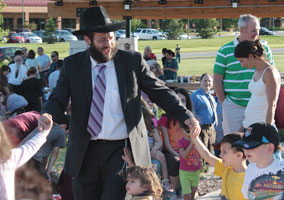
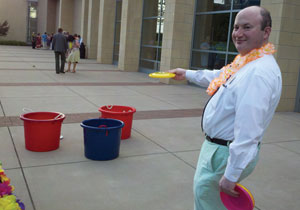



 In today’s mobile society, it’s hard to find someone who has spent 35 years at the same job. In 1977, when Rabbi Herbert J. Mandl arrived in Kansas City to serve Kehilath Israel Synagogue, even he would have said it would be tough to fathom that he’d be here that long.
In today’s mobile society, it’s hard to find someone who has spent 35 years at the same job. In 1977, when Rabbi Herbert J. Mandl arrived in Kansas City to serve Kehilath Israel Synagogue, even he would have said it would be tough to fathom that he’d be here that long. Although he chose the rabbinate, Rabbi Mandl said he had always wanted to be a lawyer and a politician. Over the years he put some of those skills to work, taking on a variety of causes. One was kashrut, working tirelessly to see to it that kosher food was available in the community. He is credited with creating the Vaad HaKashruth. He currently serves as its chairman, a position that the Vaad’s Executive Director Mendal Segal said he will keep as long as he lives in Kansas City.
Although he chose the rabbinate, Rabbi Mandl said he had always wanted to be a lawyer and a politician. Over the years he put some of those skills to work, taking on a variety of causes. One was kashrut, working tirelessly to see to it that kosher food was available in the community. He is credited with creating the Vaad HaKashruth. He currently serves as its chairman, a position that the Vaad’s Executive Director Mendal Segal said he will keep as long as he lives in Kansas City. At least one event connected with the National Day of Prayer in Kansas Thursday, May 3, in Topeka excluded Jewish people. In fact, according to a story published in the Topeka Capital-Journal, no non-Christian groups were represented at the event, held on the on the steps of the Kansas capitol and featuring Kansas Gov. Sam Brownback as master of ceremonies.
At least one event connected with the National Day of Prayer in Kansas Thursday, May 3, in Topeka excluded Jewish people. In fact, according to a story published in the Topeka Capital-Journal, no non-Christian groups were represented at the event, held on the on the steps of the Kansas capitol and featuring Kansas Gov. Sam Brownback as master of ceremonies. The JCRB|AJC greatly values Brownback’s passionate support for the state of Israel, Szneler added. In addition he pointed out that the governor has been a strong advocate on many issues of importance to the Jewish community.
The JCRB|AJC greatly values Brownback’s passionate support for the state of Israel, Szneler added. In addition he pointed out that the governor has been a strong advocate on many issues of importance to the Jewish community.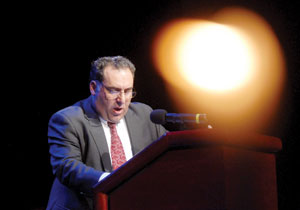 Congregation Beth Shalom will be seeing a summer of changes in its clergy. In addition to getting a new rabbi, Hazzan Robert Menes will be leaving for a new job in Las Vegas.
Congregation Beth Shalom will be seeing a summer of changes in its clergy. In addition to getting a new rabbi, Hazzan Robert Menes will be leaving for a new job in Las Vegas.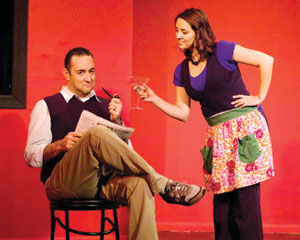 MOTHER’S DAY COMEDY — “The Union,” a sketch comedy show featuring real-life married couple Corey Rittmaster and Monique Madrid is on tap for 7:30 p.m. Mother’s Day (Sunday, May 13) at ComedyCity, located at the Westport Flea Market, 817 Westport Road on the Missouri side. Rittmaster grew up in Overland Park. Based in Chicago, the actor/improvisers and veterans of KC ComedyCity most recently toured with The Second City on board Norwegian Cruise Lines. They’ve written a new sketch comedy show that they’ll perform here. Madrid will also preview her new one-woman show that will make its debut next month at the Women’s Funny Festival, an event run by the same producers of the Chicago Sketch Fest. Be advised that the show is intended for those 16 and older as there may be some adult themes and language. Hey, with improv you just never know! For ticket information, contact ComedyCity at 816-842-2744 or visit www.comedycity.cc.
MOTHER’S DAY COMEDY — “The Union,” a sketch comedy show featuring real-life married couple Corey Rittmaster and Monique Madrid is on tap for 7:30 p.m. Mother’s Day (Sunday, May 13) at ComedyCity, located at the Westport Flea Market, 817 Westport Road on the Missouri side. Rittmaster grew up in Overland Park. Based in Chicago, the actor/improvisers and veterans of KC ComedyCity most recently toured with The Second City on board Norwegian Cruise Lines. They’ve written a new sketch comedy show that they’ll perform here. Madrid will also preview her new one-woman show that will make its debut next month at the Women’s Funny Festival, an event run by the same producers of the Chicago Sketch Fest. Be advised that the show is intended for those 16 and older as there may be some adult themes and language. Hey, with improv you just never know! For ticket information, contact ComedyCity at 816-842-2744 or visit www.comedycity.cc. 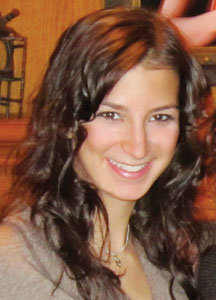 Rachael Klein and Elana Nemitoff, both members of The Temple, Congregation B’nai Jehudah, have been accepted to Hebrew Union College-Jewish Institute of Religion rabbinical school. As required, both young women will spend their first year studying in Jerusalem.
Rachael Klein and Elana Nemitoff, both members of The Temple, Congregation B’nai Jehudah, have been accepted to Hebrew Union College-Jewish Institute of Religion rabbinical school. As required, both young women will spend their first year studying in Jerusalem.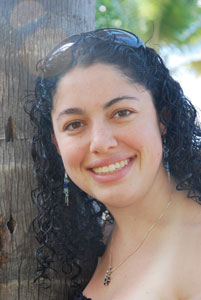 The 22-year-old Nemitoff plans to graduate May 18 with a Bachelor of Arts degree in psychology and minors in technical theater and Jewish studies from Washington University in St. Louis. Rabbi Nemitoff explained that his daughter’s path to rabbinical school “has been more circuitous but no less determined” than Klein’s.
The 22-year-old Nemitoff plans to graduate May 18 with a Bachelor of Arts degree in psychology and minors in technical theater and Jewish studies from Washington University in St. Louis. Rabbi Nemitoff explained that his daughter’s path to rabbinical school “has been more circuitous but no less determined” than Klein’s.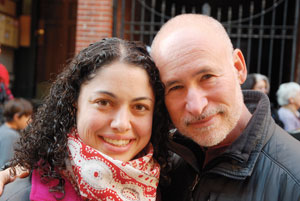 Nemitoff is hoping to continue her studies on the Cincinnati campus because she is considering a concentration in medical chaplaincy and “Cincinnati has the best program for that,” she said.
Nemitoff is hoping to continue her studies on the Cincinnati campus because she is considering a concentration in medical chaplaincy and “Cincinnati has the best program for that,” she said.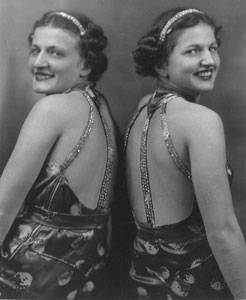 If you think blogging is one of those social-media activities limited to the tech-savvy, under-30 crowd, guess again. Residents of Village Shalom have plenty to say, and the continuing-care retirement community’s new web log, VSLifeAsIKnowIt.wordpress.com, is giving them a whole new forum for sharing their stories with the world.
If you think blogging is one of those social-media activities limited to the tech-savvy, under-30 crowd, guess again. Residents of Village Shalom have plenty to say, and the continuing-care retirement community’s new web log, VSLifeAsIKnowIt.wordpress.com, is giving them a whole new forum for sharing their stories with the world. Take a look around Taste of Europe and you will see some of the foods that Gene “Geno” Basov enjoyed while growing up in Ukraine. In one corner of the 2,200-square-foot store are candies from Russia and Ukraine. Keep walking and you will see the soft drinks and lemonade he liked as a child. And then there’s the canned fish and meats that Basov and other Europeans are familiar with from their youth and homeland.
Take a look around Taste of Europe and you will see some of the foods that Gene “Geno” Basov enjoyed while growing up in Ukraine. In one corner of the 2,200-square-foot store are candies from Russia and Ukraine. Keep walking and you will see the soft drinks and lemonade he liked as a child. And then there’s the canned fish and meats that Basov and other Europeans are familiar with from their youth and homeland.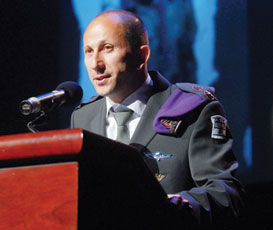 KUDOS FOR JOBS WELL DONE — Last week was a busy week, beginning with the annual Yom HaShoah commemoration, followed by Yom HaZikaron and Yom HaAtzmaut. The three organizations that produce Yom HaShoah — Midwest Center for Holocaust Education, Jewish Community Relations Bureau|American Jewish Committee and Jewish Community Center — have been doing it beautifully and flawlessly for years, as they did this year.
KUDOS FOR JOBS WELL DONE — Last week was a busy week, beginning with the annual Yom HaShoah commemoration, followed by Yom HaZikaron and Yom HaAtzmaut. The three organizations that produce Yom HaShoah — Midwest Center for Holocaust Education, Jewish Community Relations Bureau|American Jewish Committee and Jewish Community Center — have been doing it beautifully and flawlessly for years, as they did this year.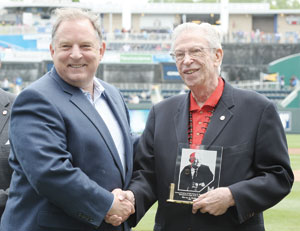
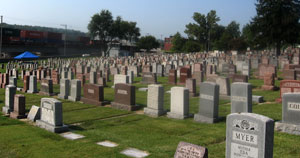 For more than 100 years, Sheffield Cemetery has remained steadfast. Nearly 6,000 people are buried on the property dating from 1901; making it one of the oldest Jewish cemeteries in Kansas City. But by 2003, visits to the cemetery revealed Sheffield was a shadow of its former self, crumbling in disrepair, including no formal chapel and, in its entirety, grounds in dire need of restoration. It was apparent that the monetary commitment for perpetual care of the grounds and chapel was not enough to maintain the cemetery with today’s struggling economy.
For more than 100 years, Sheffield Cemetery has remained steadfast. Nearly 6,000 people are buried on the property dating from 1901; making it one of the oldest Jewish cemeteries in Kansas City. But by 2003, visits to the cemetery revealed Sheffield was a shadow of its former self, crumbling in disrepair, including no formal chapel and, in its entirety, grounds in dire need of restoration. It was apparent that the monetary commitment for perpetual care of the grounds and chapel was not enough to maintain the cemetery with today’s struggling economy.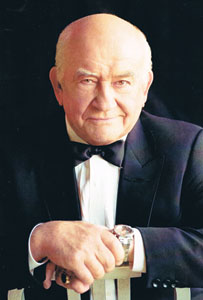 Ed Asner’s one-man performance of “FDR” is set for 7 p.m. Sunday, June 17, at the White Theatre on the Jewish Community Campus.
Ed Asner’s one-man performance of “FDR” is set for 7 p.m. Sunday, June 17, at the White Theatre on the Jewish Community Campus.